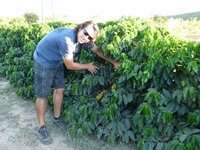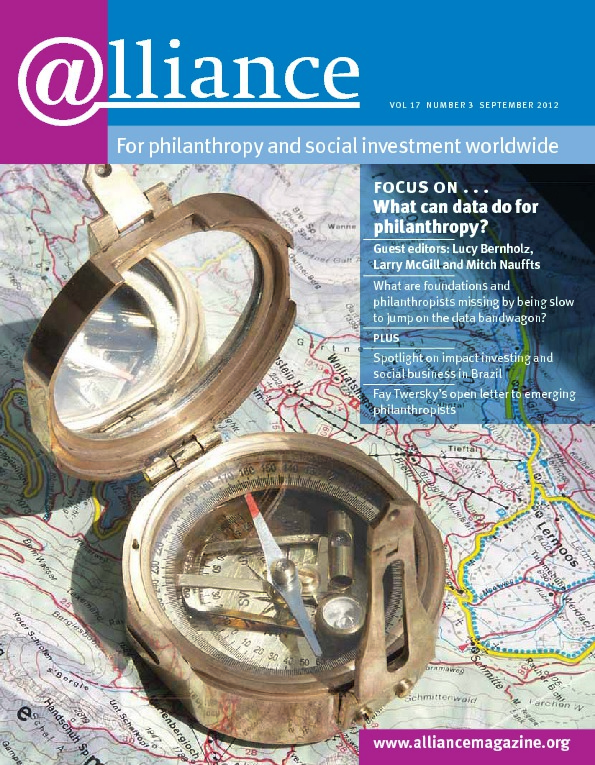‘I would say that philanthropy is harmful if you just give money without creating any accountability for how it’s used.’
Antonio Gaspar is the co-founder and executive director of Instituto Ventura in Rio de Janeiro, Brazil, which invests in innovative businesses committed to environmental sustainability. Its ultimate aim is to show that businesses can be profitable while having a positive impact on the environment. Caroline Hartnell asked him how it works and what progress has been made.
Would you describe Instituto Ventura as an impact investor?
I would say so. We are a non-profit organization driven by a social purpose: to promote sustainable businesses that benefit society as a whole. One thing that is important to mention is that we operate with the management principles of for-profit organizations. We have a system guided by specific indicators, and our disbursements are based on specific results. At the end of the chain we look for social return, but we see the financial as critical to achieving and maintaining that in the long term. That is very important in our model because we avoid interventions that may create dependency of any kind, usually related to grantmaking or badly designed philanthropy programmes. Any business that we invest in must have the potential to become self-sustaining while bringing us the expected return on the money we invest.
On the social side, our selection criteria include ventures dealing with innovative environmental technologies, services and products related to the areas we invest in: organic production, recycling, renewable energy, sustainable construction and other areas in the field of sustainability. In our view, the success of those businesses will naturally have a positive social and environmental impact on society. For instance, where we support organic production, besides employment creation, we are allowing people to consume healthy products and preventing farmers from polluting local communities’ land and water.
Another important criterion is that the social entrepreneurs we support must be aware of their social purpose and influence. Usually the entrepreneur will build local capacity in the place that the business is located and will work with local suppliers, generating local income.
Our other criteria include the management and institutional capacity of the venture: these are critical for the success of the business. We also won’t support a venture, however promising, that we think can get along by itself, because for us it is very important to add some value to the operation. 
In the end we are looking for sustainable businesses that can become benchmarks in their sector, that can become an example to the sector, the market and society in general. Basically, what we want is to help change the current pattern of businesses creating negative effects for society. We want businesses to become profitable and, at the same time, to have a positive impact on society. (Photo shows an organic coffee production project supported by Instituto Ventura.)
What is Ventura’s investment strategy?
Ventura has two investment models. In the first, we have a contract with the venture, under the terms of which we make a projection of the revenue and establish a percentage that should be returned to Ventura over a specified period of time, using the principal invested as a reference. That’s good for Ventura because we have an exit strategy defined and we get liquidity for our funds. It’s good for the businesses because they do not have the burden of a debt or even the burden of traditional equity, and possibly the need to share decision-making with Ventura. We basically operate as advisers for the business. And the feedback we receive is very positive.
In our other investment model, we look for an anchor private company, usually a big company interested in developing its small suppliers. For instance, we have a project with a large company that produces palm pulp in the south of Bahia which wants to increase production. But where they operate there is no more land to buy, and the cost of hiring people would be too high. So, in partnership with Ventura, they identified several small producers operating near the company. We both put 50 per cent into a fund which is used to finance small producers to produce heart of palm on their property; the company offers technical assistance and contracts to buy their products for five years. So we solve two problems, the technical support and the commercialization, which are usually two big barriers for small businesses.
What is the exit strategy there?
We establish a return based on fixed amounts that are updated according to specific indices. Usually it is one or two years before they start having to pay anything back.
If Instituto Ventura is a non-profit, what happens to the financial returns? Do they go back to Ventura or do they go to your investors?
Profit is reinvested in our model in other businesses to sustain and reinforce our social progress.
Our investors are private investors who, like us, want to use their funds to achieve maximum social return for the money invested, based on a self-sustainable and results-oriented model. The strategy is to achieve a successful portfolio of projects that demonstrate that it’s possible to sustain or protect the environment while making profits. They see giving back to society as part of their principles. They could do that through conventional philanthropy, but they decided to create an organization that is professional in the way it operates. We are in a sector dealing with for-profit though sustainable ventures, where we can work with very tangible business-related indicators.
Why do you say so emphatically that philanthropy is harmful?
I would say that philanthropy is harmful if you just give money without creating any accountability for how it’s used. This applies to paternalism of all kinds, to any intervention that creates dependency among its beneficiaries. Institutions and individuals in general should be more careful and accountable for their interventions, even when they simply give money away. Those interventions create expectations and may influence behaviour patterns. In parts of Brazil, for example, state programmes sometimes simply give money to families, and companies can find it difficult to hire employees because of that. Without having a productive life, people’s self-esteem becomes pretty low. And if the government cuts the programme, what do the people who have benefited do then? That type of intervention is very harmful for the social structure of the country. This happens a lot in Brazil.
What is your assessment of the field of impact investing in Brazil?
I think it has huge potential but we are at the beginning. We are still a green field, I would say. Funds are available but we are lacking good projects and entrepreneurs who have a real commitment to their social and environmental purpose plus management capacity. It is very hard to get that combination. That is why Ventura provides technical assistance and management support as well as money.
What are the barriers to expansion?
I see two big difficulties that make it tough for the entrepreneur in Brazil. First, in general, our tax burden is heavy. As a result there is a huge informal economy, which an entrepreneur who wants to operate legitimately has to compete with. Second, despite high taxes, we don’t have good physical infrastructure. We are a very big country and if you are based in a remote area, the lack of good roads, for example, can make a business unviable.
What is the potential for businesses that bring positive social and environmental benefits? Could they become the dominant form of business and transform society?
In Brazil, we are very rich in terms of biodiversity, water and natural resources of all kinds; we have a strong private sector and increasing availability of funds. So the potential to thrive for any business that can use those resources in a sustainable manner is enormous. At the same time, public opinion and legislation are turning against businesses that affect society negatively, so if you have an operation that is beneficial for the environment, you have a competitive advantage. I think the combination of great natural resources and the entrepreneurial capacity of its people puts Brazil in a very good position for exploring ventures of this sort.
Do you think that is true of Latin America generally?
I think most countries in Latin America have, like Brazil, great stocks of natural resources, and they face similar problems in terms of infrastructure, legal and tax structure, and competition from the informal economy. Many also have another barrier, which is the lack of funds to support businesses that bring positive social and environmental benefits until they are strong enough to receive mainstream funding. Brazil’s advantage is that we have funds available, the economy is functioning well, and the private sector is strong.
Antonio Gaspar is co-founder and executive director of Instituto Ventura. He will be a speaker at SEWF2012. Email antonio@ventura.org.br
For more information
http://www.ventura.org.br






Comments (0)